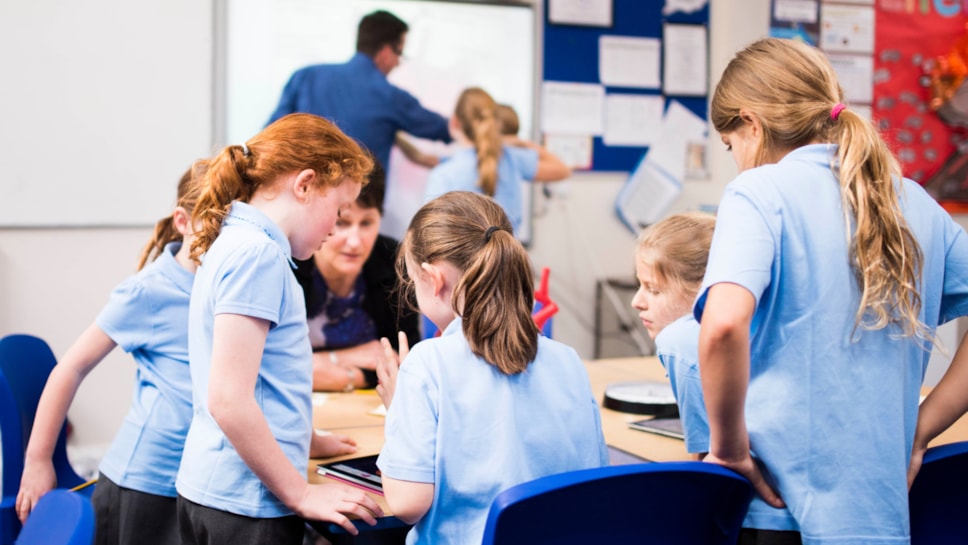
Keeping classrooms cool in a warming world
Why the future of education depends on buildings that are smarter, greener – and built to empower the next generation to lead the energy transition.
With temperatures creeping higher each year and extreme weather becoming the new norm, Britain’s classrooms are increasingly being put to the test. Research shows that the climate crisis is already disrupting education — and let’s face it – our school buildings were never designed for the climate extremes we’re now facing.
Schools are already suffering from the effects of climate extremes – with children in England facing prolonged “lost learning” caused by extreme heat and flooding at school.
And when the learning environment suffers, so does learning itself.
But here’s the good news: there’s a smarter, greener way forward.
Schools as sanctuaries – even in a heatwave
At E.ON, we believe education should be part of the solution for the climate crisis. Schools should sit at the heart of the energy transition – not just as places of learning, but as climate-resilient hubs helping to support local communities and inspire young minds.
That’s why we’re helping reimagine schools with smarter infrastructure: heat pumps that keep classrooms comfortable all year round, rooftops generating clean solar power, and intelligent energy systems that make every watt work harder.
Take Coventry, for example – a city that’s not just talking about change, but living it. Through our long-term strategic energy partnership with Coventry City Council, we’re transforming more than 100 schools with clean, green tech. From solar panels to insulation upgrades, our solutions-for-schools programme is helping build spaces where pupils can thrive – come rain or shine.
And the impact goes far beyond the bricks and mortar.
Sun-powered science lessons (and a spark for green careers)
When solar panels appear on school roofs, sustainability becomes real. It’s something you can see. Something you learn. In Coventry, pupils are tracking their school’s energy generation in real-time, using data to explore maths and science, and seeing first-hand how renewables work – not just in theory, but in everyday life.
In the past 18 months since launching our partnership, we’ve engaged more than 2,000 young people in Coventry through Net Zero Workshops, Energy Summits, career aspiration sessions and school events – bringing to life climate learning and the power of innovative approaches to make a difference.
Because it’s not just about learning about energy – it’s about learning how to shape it. E.ON’s Enterprise Advisors are working directly with local secondary schools, supporting career education, hosting school visits and showing students where a green career could take them. We’re laying the foundations for a future workforce equipped to drive the energy transition.
Why education matters
We can’t expect to transition to a cleaner, greener and more affordable energy system without a skilled workforce ready to deliver it. That’s why we’re investing in green skills from the ground up.
Our Net Zero Academy is training people of all ages with the tools and knowledge needed to power the future. From installing smart meters and EV chargers to solar panels and heat pumps, our engineers are honing the hands-on skills that will decarbonise homes, communities and entire cities.
And we’re thinking even further ahead. Our New Energy Academy offers free, curriculum-linked resources for teachers and schoolchildren – developed in partnership with educators to bring real-world energy insights into the classroom. It's about making sustainability part of everyday learning and helping more young people to see themselves in the future of energy.
Because when children grow up with these ideas embedded in their school day – when climate science is more than a headline, when heat pumps are as familiar as radiators – the leap into a green career feels a lot less like a leap, and a lot more like a natural next step.
From crisis to classroom opportunity
Let’s not sugar-coat it: climate extremes are already impacting our education system. But with the right investment, bold partnerships and a little imagination, schools can become shining examples of how to build resilience into everyday life.
Because if we want to weather the storms ahead (both literal and metaphorical) we need to build smarter. We need to build greener. And we need to make sure the next generation can learn, grow and dream – no matter the weather.
